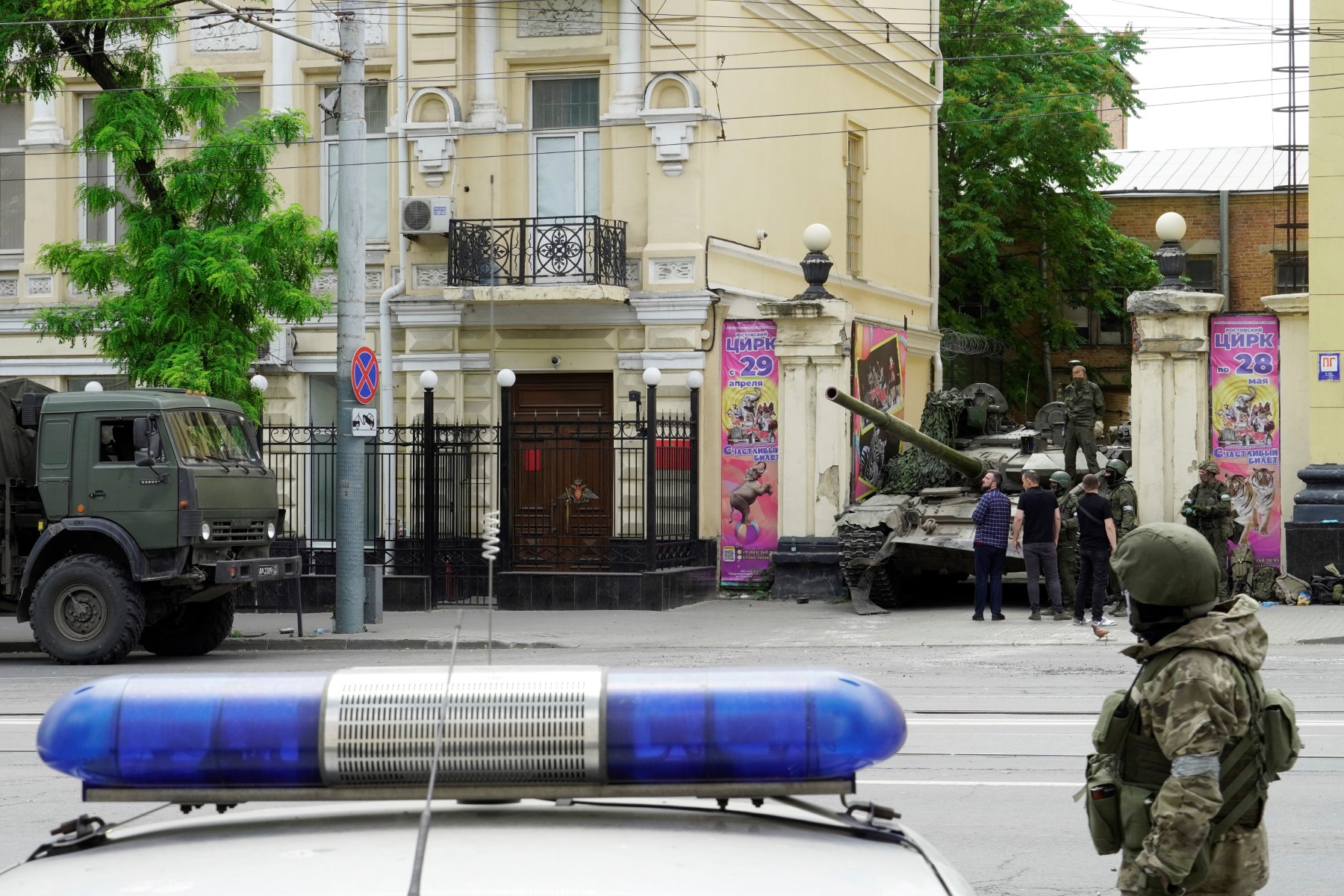MOSCOW — In a significant escalation of events, rebel mercenaries are making their way north towards Moscow after seizing a crucial military base on Saturday. This marks a grave challenge to Russian President Vladimir Putin’s leadership and poses the most serious security crisis since he assumed power in 1999.
Despite the turmoil, Putin’s spokesman assured the public that the president remained in the Kremlin and had not fled the capital. Regular forces have initiated a “counter-terrorist operation” in the Voronezh region, along the path of the rebel group known as the Wagner force, in an attempt to halt their advance towards Moscow.
The governor of the Lipetsk region, located just 420 kilometers south of Moscow, confirmed that the Wagner private military force was moving through their territory. He urged civilians to stay in their homes and not to evacuate.
Also Read Putin slams ‘treason’ as forces tackle Wagner revolt
Leaders in Ukraine viewed the infighting among their Russian adversaries as an opportunity. A deputy defense minister described it as a “window of opportunity” for Kyiv to launch a counteroffensive against Russian forces occupying Ukrainian territory.
Yevgeny Prigozhin, the chief of Wagner, once a close ally of Putin, claimed that his troops had taken control of the military command center and airbase in Rostov-on-Don, a southern city crucial to Russia’s offensive in Ukraine. Prigozhin vowed to topple Moscow’s top military leaders. He stated that they captured the headquarters without any resistance and even received support from local civilians.
Responding to the challenge, Putin addressed the nation in a televised speech, accusing Prigozhin of betrayal that endangered Russia’s survival. He emphasized the importance of national unity and vowed that those involved in the armed rebellion would face punishment before the law and the people.
#RussiaUkraineWar
— TRENDS (@mena_trends) June 24, 2023
Reports on social media claimed that key Russian leaders, including President Putin, Prime Minister Mishustin, and Deputy Chairman of the Security Council Medvedev, had left Moscow. However, their representatives have refuted these claims, confirming that they… pic.twitter.com/0RuiQi5VjR
The FSB security service labeled Prigozhin’s actions an attempt to spark a “civil conflict” and called on Wagner fighters to detain him. Another Putin ally, Ramzan Kadyrov, the Chechen strongman, announced that he had dispatched his own units to assist in quelling the Wagner rebellion, even if harsh measures were necessary.
Belarus expressed support for Moscow in the conflict, stating that any internal turmoil within Russia was a gift to the collective West. Latvia announced tightened security on its Russian border and declared that it would not admit refugees escaping the chaos.
In Ukraine, the capital city of Kyiv experienced casualties and injuries due to an overnight barrage of Russian cruise missiles and attack drones. Three people were reported dead, and nearly a dozen were injured.
Prigozhin retaliated against Putin’s accusations, asserting that they were patriots of their homeland and would not surrender to the president or the FSB’s demands.
#RussiaUkraineWar
— TRENDS (@mena_trends) June 24, 2023
Turkish leader Recep Tayyip #Erdogan voiced full support for Russian President Vladimir #Putin in a phone call to discuss the #Wagner mercenary group's armed insurrection in #Russia, the #Kremlin said Saturday. @RTErdogan @mfa_russia @MFA_Ukraine… pic.twitter.com/YEFFfSp3pu
Meanwhile, Ukraine’s President Volodymyr Zelensky viewed Russia’s internal strife as a sign of weakness. He emphasized that as long as Russian troops and mercenaries remained on Ukrainian soil, Russia would face chaos and problems. Zelensky affirmed Ukraine’s ability to protect Europe from the spread of Russian aggression.
As the rebel force advanced north through Voronezh and Lipetsk towards Moscow, the city’s mayor announced the implementation of “anti-terrorist” measures to ensure the protection of critical facilities. Security was heightened, and law enforcement sources confirmed reinforced protection.
The ongoing feud between Prigozhin’s group and Moscow’s military leadership intensified. Prigozhin blamed Defense Minister Sergei Shoigu and Chief of the General Staff Valery Gerasimov for the deaths of his fighters. The Russian defense ministry warned of an impending assault near the eastern hotspot of Bakhmut, taking advantage of the internal strife.
Notably, Prigozhin’s attempt to force a leadership change in the Russian defense ministry “is unlikely to succeed,” according to the Washington-based think tank, the Institute for the Study of War. They pointed out that General Sergei Surovikin, commander of Russia’s aerospace forces, publicly denounced Prigozhin’s call for rebellion, urging him to stop his efforts.
In a surprising development, President Recep Tayyip Erdogan of Turkey expressed readiness to help facilitate a “peaceful resolution” to the armed rebellion in Russia.
During a phone call with President Putin, Erdogan emphasized the importance of acting with common sense and stated that Turkey was prepared to contribute to resolving the events in Russia as quickly as possible.
Concerns over the rebel mercenaries’ advance towards Moscow prompted authorities in the Kaluga region, south of the capital, to impose travel restrictions. Governor Vladislav Shapsha urged residents to refrain from using private vehicles on certain roads, unless absolutely necessary.
The travel restrictions primarily affected transport arteries connecting the Kaluga region with neighboring areas, including those bordering Ukraine. As the situation continues to unfold, the fate of Russia hangs in the balance.
The rebel mercenaries’ march towards Moscow poses a significant threat to President Putin’s rule, while internal divisions and infighting among key military and political figures exacerbate the crisis. The outcome of this ongoing conflict will have far-reaching implications for Russia, its neighboring countries, and international stability.
(With agency inputs)







